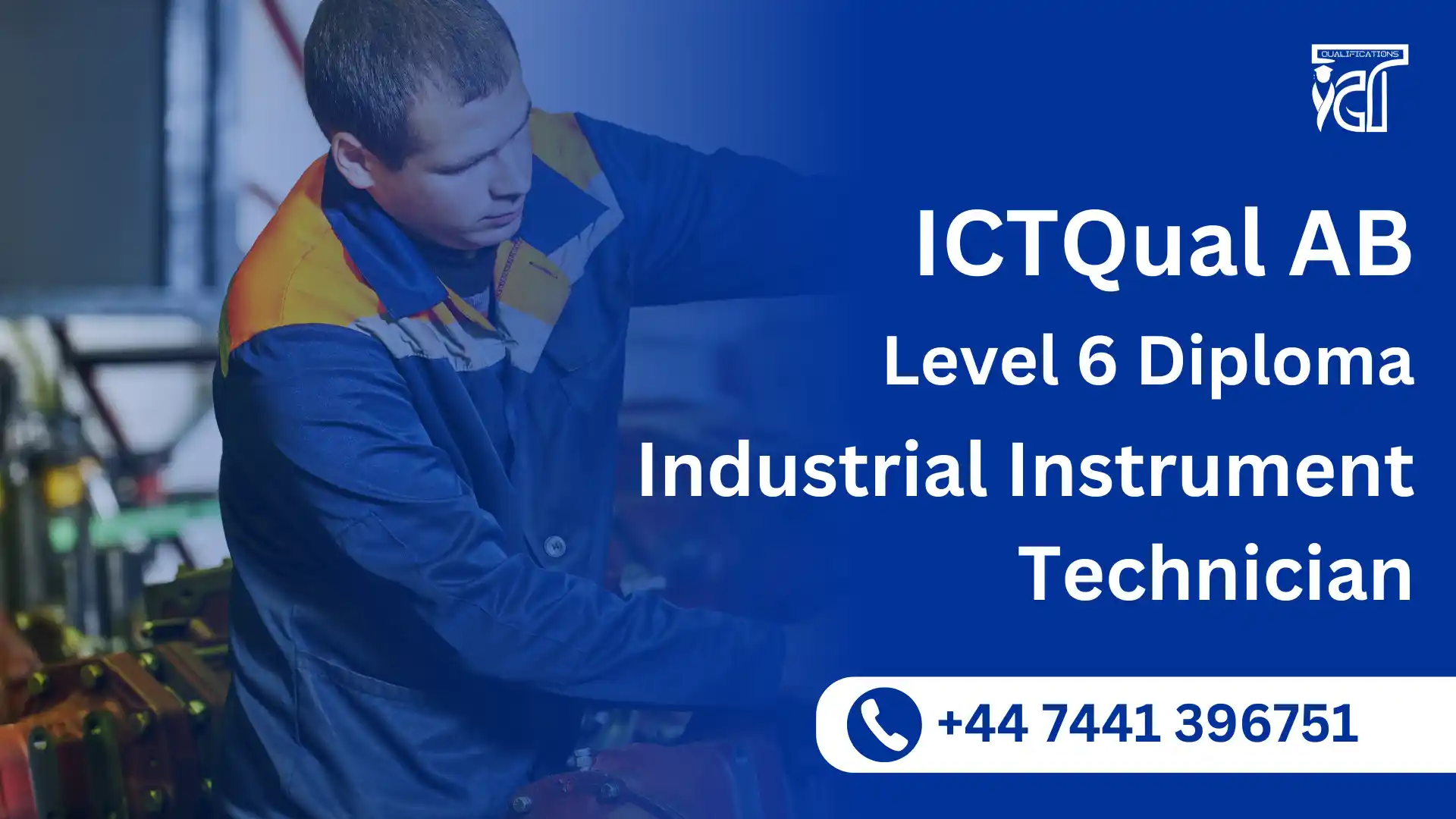The ICTQual AB Level 6 Diploma in Industrial Instrument Technician is an advanced qualification designed for professionals seeking to deepen their expertise in industrial instrumentation, automation, and process control. The ICTQual AB Level 6 Diploma in Industrial Instrument Technician builds on prior technical knowledge and equips learners with the advanced skills required to manage, design, and optimize complex instrumentation systems used across global industries.
Learners will explore advanced instrumentation principles, calibration methodologies, and control system integration. The course covers critical areas such as distributed control systems (DCS), programmable logic controllers (PLC), advanced measurement techniques, and industrial networking. By combining in-depth theoretical knowledge with applied learning, the diploma ensures graduates are prepared to handle the challenges of modern industrial environments.
A strong emphasis is placed on safety management, regulatory compliance, and advanced diagnostic procedures. Through real-world case studies, simulations, and project-based learning, participants develop the ability to analyze complex technical problems, implement innovative solutions, and make strategic decisions that enhance operational efficiency and reliability.
The ICTQual AB Level 6 Diploma in Industrial Instrument Technician is particularly suited for experienced technicians, engineers, and professionals aiming to progress into senior technical or supervisory roles. It provides the confidence and competence needed to lead teams, oversee large-scale projects, and contribute to organizational growth in industries where precision and reliability are critical, such as oil & gas, petrochemicals, energy, and advanced manufacturing.
Beyond immediate employment opportunities, the ICTQual AB Level 6 Diploma also serves as a pathway to higher-level professional certifications and postgraduate study in engineering and industrial technology. Graduates are well-positioned for leadership roles, international career opportunities, and continuous professional development, making this diploma a valuable investment for long-term success in the field of industrial instrumentation.
ICTQual AB Level 6 Diploma in Industrial Instrument Technician
This qualification, the ICTQual AB Level 6 Diploma in Industrial Instrument Technician, consists of 6 mandatory units.
- Advanced Principles of Industrial Instrumentation
- Process Dynamics and Complex Variable Control
- Advanced Instrument Calibration and Quality Assurance
- Industrial Sensors, Transducers, and Final Control Elements
- Distributed Control Systems (DCS), PLCs, and Advanced Automation
- Reliability, Maintenance Strategies, and Industrial Safety Management
Learning Outcomes for the ICTQual AB Level 6 Diploma in Industrial Instrument Technician:
Advanced Principles of Industrial Instrumentation
- Critically evaluate advanced theories and principles of industrial instrumentation.
- Analyse the role of instrumentation in optimising complex industrial processes.
- Apply advanced measurement concepts including accuracy, precision, and uncertainty analysis.
- Assess the impact of instrumentation design on system performance and reliability.
- Integrate knowledge of electronics, control theory, and instrumentation for advanced applications.
- Demonstrate the ability to design and configure instrumentation systems for specialised industries.
- Evaluate international standards and compliance requirements in advanced instrumentation.
- Develop problem‑solving skills for complex instrumentation challenges.
Process Dynamics and Complex Variable Control
- Explain the dynamic behaviour of industrial processes and their impact on control strategies.
- Model and analyse multi‑variable process systems using advanced techniques.
- Apply control theory to manage interacting process variables effectively.
- Evaluate the performance of advanced control strategies such as cascade, feedforward, and ratio control.
- Implement optimisation techniques for stability, accuracy, and efficiency in process control.
- Assess the role of process dynamics in safety, quality, and productivity.
- Use simulation tools to predict and improve process behaviour under varying conditions.
- Develop advanced troubleshooting skills for dynamic process control systems.
Advanced Instrument Calibration and Quality Assurance
- Apply advanced calibration methods for complex industrial instruments.
- Evaluate calibration standards, traceability, and international compliance frameworks.
- Design and implement calibration schedules for large‑scale industrial operations.
- Analyse calibration data to ensure accuracy, reliability, and repeatability.
- Integrate quality assurance principles into calibration and testing procedures.
- Troubleshoot calibration issues and propose corrective actions.
- Document calibration processes in line with advanced industry standards.
- Develop strategies to minimise downtime and optimise calibration efficiency.
Industrial Sensors, Transducers, and Final Control Elements
- Critically analyse the design and operation of advanced industrial sensors and transducers.
- Select appropriate sensing technologies for complex industrial applications.
- Evaluate the performance characteristics of sensors under varying conditions.
- Assess the role of final control elements, including advanced control valves and actuators.
- Integrate sensors and final control elements into distributed and automated systems.
- Diagnose and resolve faults in advanced sensing and control devices.
- Apply knowledge of material properties and environmental factors in sensor selection.
- Develop innovative solutions for integrating smart sensors and IoT technologies.
Distributed Control Systems (DCS), PLCs, and Advanced Automation
- Explain the architecture and functions of modern DCS and PLC systems.
- Develop advanced PLC programming skills using structured programming languages.
- Integrate DCS and PLC systems with industrial networks and communication protocols.
- Apply automation strategies to optimise process efficiency and reliability.
- Evaluate cybersecurity considerations in industrial automation systems.
- Troubleshoot complex automation systems involving multiple controllers.
- Implement advanced human‑machine interface (HMI) and SCADA solutions.
- Assess the role of automation in Industry 4.0 and smart manufacturing environments.
Reliability, Maintenance Strategies, and Industrial Safety Management
- Evaluate advanced maintenance strategies including predictive and condition‑based maintenance.
- Apply reliability engineering principles to instrumentation and control systems.
- Develop systematic troubleshooting frameworks for complex industrial systems.
- Assess the role of safety management systems in high‑risk industrial environments.
- Implement international safety standards and regulatory compliance practices.
- Analyse risk factors and develop mitigation strategies for instrumentation systems.
- Integrate reliability and safety considerations into system design and operation.
- Promote a culture of continuous improvement, safety, and reliability in industrial practice.
The ICTQual AB Level 6 Diploma in Industrial Instrument Technician offers advanced learners and professionals the opportunity to gain specialized expertise in industrial instrumentation, automation, and process control. This diploma not only enhances technical competence but also strengthens leadership potential, international recognition, and long-term career growth.
1. Career Advancement
- Opens pathways to senior roles such as Lead Instrument Technician, Control Systems Engineer, or Instrumentation Supervisor
- Provides a competitive edge in technical recruitment and promotions within global industries
- Increases employability in high-demand sectors such as oil & gas, petrochemicals, energy, and advanced manufacturing
- Supports career mobility across international markets where advanced instrumentation skills are valued
- Builds a foundation for leadership and project management responsibilities
2. Advanced Technical Skills
- Master advanced calibration, measurement, and control system integration techniques
- Gain expertise in distributed control systems (DCS), PLCs, and industrial networking
- Develop advanced troubleshooting and diagnostic skills for complex instrumentation systems
- Learn to design, optimize, and maintain large-scale industrial control systems
- Strengthen applied knowledge through real-world case studies and project-based learning
3. Academic and Professional Progression
- Acts as a stepping stone to postgraduate study in engineering, automation, or industrial technology
- Builds eligibility for advanced professional certifications in instrumentation and process control
- Supports continuous professional development (CPD) goals for senior-level professionals
- Enhances academic credibility for learners pursuing higher education or research opportunities
- Provides recognition for entry into professional engineering or technical associations
4. Industry-Relevant Knowledge
- Covers advanced topics such as automation, robotics, industrial safety, and regulatory compliance
- Aligns with international industry standards and best practices
- Prepares learners for leadership roles in modern, technology-driven industrial environments
- Ensures adaptability to emerging technologies in industrial automation and digital transformation
- Provides knowledge applicable across multiple industries and global markets
5. Recognition and Credibility
- Earn an internationally respected Level 6 diploma valued by employers worldwide
- Demonstrates mastery of advanced technical and leadership skills in instrumentation
- Strengthens credibility in both local and international job markets
- Provides recognition that supports career mobility across industries and countries
- Establishes graduates as highly skilled professionals aligned with global industry standards
The ICTQual AB Level 6 Diploma in Industrial Instrument Technician is designed for ambitious professionals who want to advance their expertise in industrial instrumentation, automation, and process control. This qualification is best suited for learners who already have a technical foundation and are ready to progress into senior-level roles, leadership positions, or advanced academic pathways.
1. Career Aspirations
- Professionals aiming for senior roles such as Lead Instrument Technician, Control Systems Engineer, or Instrumentation Supervisor
- Individuals seeking international career opportunities in oil & gas, petrochemicals, energy, and advanced manufacturing
- Learners committed to long-term career growth in industrial instrumentation and automation
- Technicians aspiring to move into supervisory, project management, or consultancy roles
- Professionals who want to enhance their employability in competitive global markets
2. Educational Background
- Learners who have successfully completed a Level 5 Diploma or equivalent qualification in instrumentation, engineering, or related fields
- Candidates with strong foundations in mathematics, science, and engineering principles
- Individuals who have completed vocational or technical training in industrial systems
- Learners preparing for postgraduate study in engineering, automation, or industrial technology
- Professionals seeking academic recognition for their technical expertise
3. Work Experience and Skills
- Experienced technicians or engineers working in instrumentation, process control, or automation
- Maintenance staff or supervisors looking to formalize and advance their skills
- Professionals with hands-on experience in calibration, measurement, and control systems
- Individuals with problem-solving and analytical skills who thrive in technical environments
- Learners eager to develop advanced diagnostic and system optimization capabilities
4. Learning Preferences
- Learners who value a balance of advanced theory and applied, project-based learning
- Individuals motivated by real-world case studies, simulations, and practical workshops
- Candidates who prefer structured, step-by-step progression in complex technical subjects
- Professionals who thrive in environments that emphasize safety, compliance, and innovation
- Learners who want to apply advanced knowledge directly to workplace challenges
5. Personal Qualities
- Ambitious individuals with a passion for industrial technology and innovation
- Learners who are detail-oriented and committed to precision in their work
- Professionals with leadership potential and the ability to guide technical teams
- Individuals who value continuous professional development (CPD) and lifelong learning
- Learners determined to achieve international recognition and credibility in their field
The ICTQual AB Level 6 Diploma in Industrial Instrument Technician opens advanced pathways for learners to progress academically, professionally, and personally. Graduates of this diploma are well-positioned for senior technical roles, international opportunities, and higher-level study, making it a valuable investment for long-term career success.
1. Academic Progression
- Eligibility to progress to postgraduate study in engineering, automation, or industrial technology
- Opportunity to pursue Level 7 Diplomas or equivalent advanced qualifications
- Strong foundation for specialized certifications in automation, robotics, and control systems
- Recognition for entry into professional engineering programs at universities
- Enhanced academic profile for learners aiming to transition into research or teaching roles
2. Career Progression
- Access to senior roles such as Lead Instrument Technician, Control Systems Engineer, or Instrumentation Supervisor
- Pathway to project management and leadership positions in technical teams
- Opportunities across high-demand industries including oil & gas, petrochemicals, energy, and advanced manufacturing
- Increased employability in international markets where advanced instrumentation skills are sought
- Potential to transition into consultancy roles or technical advisory positions
3. Professional Development
- Builds a strong base for continuous professional development (CPD) at senior levels
- Enhances credibility for membership in professional engineering and technical associations
- Supports long-term career growth by aligning with global industry standards
- Encourages adaptability to emerging technologies in industrial automation and digital transformation
- Provides recognition that supports career mobility across industries and countries
4. International Opportunities
- Globally recognized diploma valued by employers in multiple countries
- Increased mobility for learners seeking overseas employment in technical and supervisory roles
- Alignment with international safety and regulatory standards for cross-border employability
- Access to global career opportunities in automation, process control, and instrumentation
- Enhanced credibility when applying for further study or certifications abroad
5. Personal Growth and Skills Development
- Development of strategic thinking and leadership skills alongside technical expertise
- Improved confidence in managing complex industrial systems and large-scale projects
- Strengthened ability to mentor and guide junior technicians in the workplace
- Enhanced adaptability to rapidly evolving industrial technologies
- Greater sense of achievement through earning an internationally respected Level 6 qualification
Entry Requirements
The ICTQual AB Level 6 Diploma in Industrial Instrument Technician is an advanced qualification designed for professionals aiming to progress into senior technical and supervisory roles. To ensure learners are prepared for the academic and practical demands of this diploma, the following entry requirements apply:
Minimum Age
- Applicants must be 18 years of age or older at the time of enrollment.
- This ensures learners have the maturity and professional readiness required for advanced technical training.
Educational Background
- A Level 5 Diploma or equivalent qualification in instrumentation, engineering, or a related technical field is recommended.
- Strong foundations in mathematics, science, and engineering principles are essential.
- Candidates with vocational or technical qualifications in industrial systems are encouraged to apply.
Work Experience
- While not always mandatory, relevant work experience in instrumentation, process control, or automation is highly beneficial.
- Ideal candidates include technicians, engineers, or maintenance staff with hands-on exposure to industrial systems.
- Experience in calibration, troubleshooting, or control systems will provide a strong advantage.
Language Proficiency
- Learners must demonstrate proficiency in English (or the language of instruction).
- The ability to read, write, and communicate effectively is essential for understanding advanced technical materials, safety standards, and assessments.
- Applicants may be required to provide evidence of language proficiency through prior qualifications or equivalent assessments.
Additional Recommendations
- A strong interest in industrial instrumentation, automation, and process control.
- Commitment to continuous professional development (CPD) and career progression.
- Willingness to engage in both theoretical learning and advanced project-based training.
Register Now
Qualification Process
Qualification Process for the ICTQual AB Level 6 Diploma in Industrial Instrument Technician
- Self-Assessment:
Begin by evaluating your eligibility to ensure you meet the qualification requirements, including work experience, knowledge, and language proficiency. - Registration:
Complete your registration by submitting the required documents, including a scanned copy of a valid ID, and paying the registration fee. - Induction:
An assessor will conduct an induction to confirm your eligibility for the course and explain the evidence requirements. If you do not meet the criteria, your registration will be cancelled, and the fee will be refunded. - Assignments & Evidence Submission:
Provide all assignments and the necessary evidence based on the assessment criteria outlined in the course. If you are unsure of the required evidence, consult with the assessor for guidance on the type and nature of evidence needed. - Feedback and Revision:
The assessor will review your submitted evidence and provide feedback. Evidence that meets the criteria will be marked as “Criteria Met,” while any gaps will be identified. You will be asked to revise and resubmit if needed. - Competence Evidence:
Submit final evidence demonstrating that all learning outcomes have been met. This evidence will be marked as “Criteria Met” by the assessor once it is satisfactory. - Internal Quality Assurance (IQA):
The Internal Quality Assurance Verifier (IQA) will review your evidence to ensure consistency, quality, and compliance with standards. - External Verification:
The IQA will submit your portfolio to ICTQUAL AB External Quality Assurance Verifiers (EQA) for final confirmation. The EQA may contact you directly to verify the authenticity of your evidence. - Certification:
Upon successful completion of all checks, ICTQUAL AB will issue your official certificate, confirming that you have attained the ICTQual AB Level 6 Diploma in Industrial Instrument Technician







